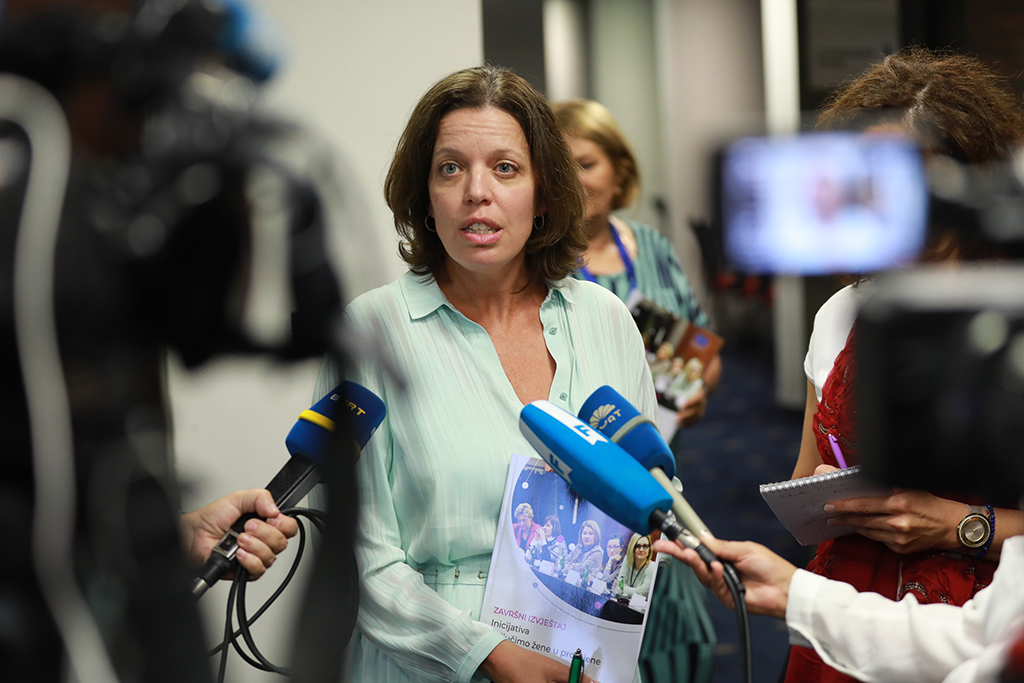“A feminist perspective is necessary in the Swedish government’s global response to corona.”
The great unemployment and economic crisis, which is already a fact and is likely to deepen, is hitting women especially hard, writes Petra Tötterman Andorff, Kvinna till Kvinna's secretary-general, in an op-ed originally featured in daily newspaper Sydsvenskan in Sweden.

The consequences of the coronavirus are impossible to predict, but one conclusion can be drawn already. Crises always reinforce structural differences and injustices in society.
In countries with widespread poverty, poor health systems and non-existent social protection, women will be hit especially hard in the wake of the pandemic. Therefore, it’s of the utmost importance that the Swedish government adhere to its feminist foreign policy as it faces the global corona crisis and helps to rebuild communities.
The new coronavirus has surprised the world in just a few weeks. Country after country has declared state of emergency and no one knows how many victims will be perished. Partly by the virus itself, and partly as a result of all the measures taken to prevent the spread.
In countries with widespread poverty, ill-equipped health systems and non-existent social protection, the corona will hit harder and, due to deep-rooted inequality, women and girls will suffer worse than men.
Recently, Sweden’s Minister for International Development Cooperation, Peter Eriksson, declared that Sweden should provide extra support to, for example, the UN World Health Organization, WHO.
In a global crisis, cross-border cooperation and support for resource-poor countries is invaluable. However, there was no clear link to Sweden’s acclaimed feminist foreign policy that is to permeate Swedish aid and development cooperation in the minister’s speech on efforts in connection with the corona crisis.
A feminist perspective in the government’s global response to the virus outbreak is crucial.
Nearly a third of the world’s population is now isolated in their homes, which means that many women who are subjected to violence are trapped with their perpetrator. This is particularly serious in countries with strict curfews, especially those associated with high fines and even imprisonment. The Swedish government must therefore review the need for extra support for women’s rights organisations and women’s shelters.
The great unemployment and economic crisis that is already here – and is likely to deepen – is hitting women particularly hard. Women more often than men have unsafe jobs, work part-time or in the informal sector. Women also aren’t as well connected to unions and social safety nets.
The Swedish government must now look at how women’s economic vulnerability in poor countries can be alleviated in the wake of the coronavirus. When financial support plans are drawn up, it should be in dialogue with representatives from women’s rights organisations who know which measures will benefit women.
The state of emergency that now exists in many parts of the world can be utilised by authoritarian leaders and regimes to restrict human rights and freedoms. It contributes to the negative trend of shrinking space and more authoritarian governance that has become evident in more and more countries in recent years. Within Kvinna till Kvinna, we know from our cooperation with women’s rights organisations around the world that women’s rights activists are those affected first and hardest.
When the most acute phase of the corona pandemic is over, the Swedish government, together with the international community, must ensure that countries return to a normal order. It must review the need for extra support for human rights activists and, above all, women’s rights activists in the wake of the corona crisis.
It is also important for decision makers to learn lessons from past crises and not make the same mistake. During the Ebola epidemic in Sierra Leone, 4,000 people died in Ebola, while 45,000 women and children died in maternal and child mortality. It was a result of hospital resources being reserved for the fight against Ebola and is a clear example of what can happen when the feminist perspective is disconnected from the strategies used to fight an epidemic. The government must also review the support so that pregnant women do not have to put their lives at risk in countries with weak health systems during the corona crisis.
Another lesson is that local women’s organisations keep society together during crises. Especially in countries where government and government institutions are weak. Local women’s organisations can identify what needs to be done at an early stage, they are active at all stages of the crisis and remain when it is time to rebuild the community.
By supporting, in particular, local women’s organisations on site in poor countries, Sweden can contribute to a faster reconstruction following the ongoing corona pandemic.
Petra Tötterman Andorff
Secretary-General
The Kvinna till Kvinna Foundation
This piece was originally featured in Swedish in Sydsvenskan on March 30th 2020.